#14: 1981 – Guyana, Part 2
Let’s return to the Guyana story for a bumpy road to a happy ending.
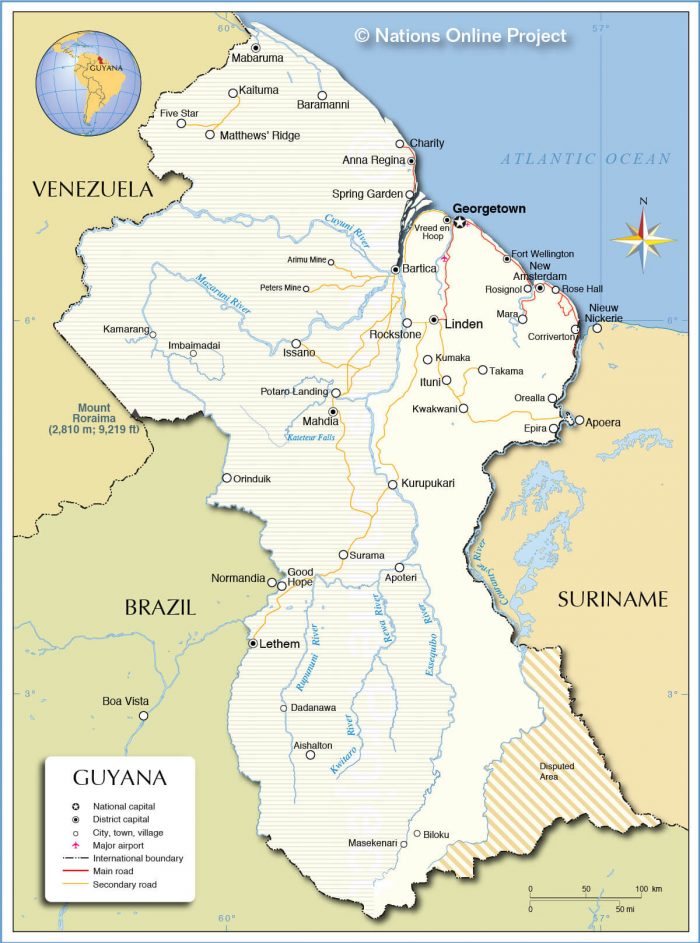
August 13
Workshop field trip delayed by driving rainstorm, but we managed to leave by 8:15. Up Timehri Road to Linden Hwy, then on dirt/sand track through dense second-growth bush (former timber land) to Mrs. Sharif’s farm where James and MOA staff were to conduct sessions on method-and-result demonstrations. AID observers there too.
Sessions went pretty well, altho the Ps weren’t clear on whether they were there to learn the content of the demos or focus on the methodology. Because James can’t hear well, he missed a lot of the questions and didn’t keep the session as focused as it might have been.
One of the Ps, Aziz (who’s been acting out since the beginning), took advantage of the confusion to be disruptive. His peers called him on it; the demonstrators called him on it; and I called him on it. He persisted, so when the afternoon session was over, he and I went for a walk and a talk. I said I didn’t know why he failed to respond to all the negative feedback or why he needed to be so disruptive, but I wanted him to think about something over the weekend: if he found he couldn’t behave more positively, I would speak to Walter, and he (Aziz) could skip the rest of the course and return home promptly. Aziz said his comments had been apropos of the topic. I said, “No, they were designed to embarrass the leader and to prove that you know more than he does. You stopped the discussion flow rather than contributing to it. You have a lot of skills and knowledge, but you use them destructively.”
Aziz was quiet for a while, and I said “What do you think?”
“Maybe it’s too late to change.”
“It’s never too late to change. You’re too bright to behave this way.”
Not very convincingly: “I will try.”
“Let’s both try. You try to behave more positively, and I’ll try to help you.”
We shook hands, but I’m not very sanguine about the future.
August 14
Trying to fathom, not very successfully, what these experiences mean for the long run. Clearly, I don’t want to work with a partner who epitomizes what I think is wrong for facilitating development. And clearly, I don’t want to spend the rest of my life running training projects. Plus I like being in the field, not managing projects from an office. I don’t know what somebody like me should be doing. I can only discover what I shouldn’t.
My morning session on leading a discussion worked. When break time came, the Ps wanted to postpone it until each person had a chance to lead a discussion.
After lunch, the groups completed their program plans, while I wrote the week’s course activities to be evaluated on newsprint. James came up and said he didn’t think the program-planning exercise should be evaluated.
“Why?”
“Because it was done at the last minute.”
“But that’s good training — responding to needs as they arise. We talked it over during the break with consensus for an exercise and scrapping the afternoon sessions on exhibits.”
“I think it’s a bad exercise, and I don’t want it to affect the evaluation of my morning session.”
“That’s why I broke them out — to get the participants’ evaluation of both your lecture and the exercise.”
“I don’t think you all should have developed this form in such a hurry. It’s not good.”
“I agree. You should have developed an exercise as an integral part of your lesson.”
“I had too much material to cover to have an exercise too.”
“This is supposed to be a practical skills course. Look at the objective: ‘…the participant will be able to…plan an extension program.’ “
“Oh, you’re just a process person.”
“USDA sent you the paper on their training philosophy. The course document, including objectives and schedule, was developed and agreed to by the Ministry, AID and USDA. It is a process course.”
[James became increasingly abusive in his comments, belittling the course design and my professional background and skills.]
Later, Ram wanted to talk with me because James’s presentations aren’t relevant to the Guyanese situation. He asked if I’d given James the materials about Guyana which I’d collected in July. I said I had, including xeroxes of additional materials from Washington. I added that I’d asked James to research MOA practices and procedures so he could make his presentations specific to the Guyanese situation. I welcomed Ram’s suggestions about how to manage this problem better. He hoped our planned trip south would help James get a better picture of Guyanese agriculture.
After the day’s training, I went to AID, where the Ag Officer said, “Oh good, I want to talk with you. Is James here?”
“No, but we can call him.”
“That’s OK. I’ll talk with you first. [The Training Officer] and I’ve been discussing what happened yesterday. James needs to get a hearing aid, and Aziz doesn’t get a second chance. James can’t hear well enough to follow what’s happening, and Aziz is too disruptive. I’m going to talk to James on Monday and ask Walter to remove Aziz from the course.”
I argued for giving Aziz another chance after our talk yesterday, but the Ag Officer feels there are too few days left in the course to risk his ruining another one.
The AID Ag Officer and Training Officer are worried about James’s effectiveness in general. I shared my own concerns, leaving out some of his nastiness and admitting I might have managed it better. The Ag Officer wants to meet with Ram tomorrow and with James afterwards.
This evening I tallied the training week’s evaluations. Ps rated the program-planning exercise that Ram, Jorge and I developed “helpful,” as well as the one on leading a discussion. James’s two lectures were rated lower.
August 15
Saturday: James and I were using AID facilities to prep materials for next week when Ram and the AID Ag Officer arrived. We sat down to coffee and tea in the latter’s office and discussed the course, especially Aziz. Ram had already talked to Walter, and everyone is agreed that Aziz should leave.
We visited for a while, James squirming with impatience to leave. I think he has no comprehension of the need to modify our US rhythms and of the professional value of time spent “socializing.” That last half-hour wasn’t idle chit-chat but important solidifying of working relationships. It was just as important as the previous half-hour spent overtly discussing business.
August 16
Downstairs by 6:03 for a 6:00 rendezvous. James fuming: “I told Ram we’d give you two more minutes, and then we’d come up and get you.” He then drank another cup of coffee standing by the front desk, a cup which he’d conned someone into bringing because the dining room wasn’t open yet. Meanwhile, Ram and I sat waiting.
 We started in the dark, watching the dawn through coconut groves and across rice paddies. Arrived at Berbice River around 8 and onto the ferry with no trouble. Sat up on deck, riding through the cool breeze past women sacrificing food and flowers to the river, a bauxite ship heading down-stream and floating islands of vegetable matter from the creeks.
We started in the dark, watching the dawn through coconut groves and across rice paddies. Arrived at Berbice River around 8 and onto the ferry with no trouble. Sat up on deck, riding through the cool breeze past women sacrificing food and flowers to the river, a bauxite ship heading down-stream and floating islands of vegetable matter from the creeks.
Passed many wonderful place names. My favorite: “Catherina’s Lust.” I imagine “lust” is a perfectly respectable word in the original language, but I have a vision of some 19th century lady wearing out the local dandies.
Stopped at Whim to meet the local Ag Field Assistant and have breakfast with his family. At 10 a.m., we sat down to dhal, curried beef, glutinous eggplant, chapattis and roti, washed down with very sweet, milky coffee.
Toured Black Bush Polder, stopping at Ag. Demo stations, where we were presented with coconuts by a couple fellows to whom we’d given a lift when their truck broke down. James, as he looks through their front door into the living room: “And what’s for sale here?”
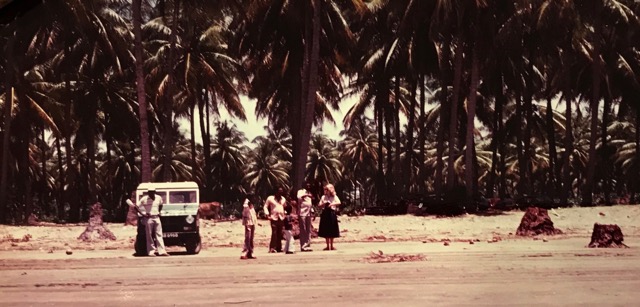 Then to Village 63 (truly its name), where Ram was Ag. Field Assistant a decade ago. 63 beach has eroded to mud-flats in the past 10 years. You can see the sandbar which formed about half a mile out. Too bad: the longest beach in the Caribbean — 7 miles — doesn’t have any sand.
Then to Village 63 (truly its name), where Ram was Ag. Field Assistant a decade ago. 63 beach has eroded to mud-flats in the past 10 years. You can see the sandbar which formed about half a mile out. Too bad: the longest beach in the Caribbean — 7 miles — doesn’t have any sand.
Returned to Village 63, stopping at an Indian house where about 10 men were sitting underneath getting soaked on rum and Pepsi. I took first a Pepsi and then a cider, both sans ice. Lots of mildly boisterous visiting.
A further drive south to where the road ends at Corriverton. Across the river is Surinam, where 50,000 Guyanese are officially known to work. The true figure is probably much higher, I’m told.
Back to the same 63 house, arriving at 3:00, for a lunch of mutton curry, rice and dhal washed down with cider. Turned out it was the second day of a family wedding, so that’s why we were getting drunk and eating curry together.
August 17
James conducted the morning session on chairing a meeting and giving a speech. His training much improved. So trip helped?
Walter took James aside after the break, later telling me he’d explained to James that this was a course on methods, not academic knowledge.
This evening, Jorge divulged that Walter had asked him not to come to class so much (even tho Walter had previously announced to the group that Jorge would be with us throughout the course as a resource). He also reported that Ram told him this was because his presence “intimidates and threatens” James. I tried to buck up Jorge by saying this admonishment was more about James than him.
Feels like I’m in the Byzantine Empire. Everybody’s intriguing, and things are getting blown out of proportion. Jorge reported Walter saying, “We have a serious problem with the course.” I don’t think that’s true. The course is going quite well on the whole. Both James and Aziz have been problems from my point of view, but not incapacitating ones. Are the AID Officers and Walter over-reacting?
August 18
Torrential rain, making over half the class an hour late. The VTR didn’t arrive despite a 6-weeks reservation; the Minister decided yesterday evening that he wanted the equipment today. So the Ps’ 5-minute speeches couldn’t be videotaped and played back as planned. We used a buddy system to share comments, but it’s not the same as seeing yourself.
Second half of the afternoon devoted to planning the workshops that the Ps will deliver to farmers next week. This exercise is designed to give them real-world experience preparing and conducting a workshop. Each group will have an advisor to help them put learning into practice. James is advising the Cabbage Workshop, and I’m helping the Cassava group.
August 19
James conducted a session on supervision and management — 3 hours of dry, culture-bound lecture unrelated to learner needs or course objectives. He also used a management form which Dr. H, Ram and I had all said was inappropriate when he asked our opinion. Maybe James can’t do what’s needed. I was in despair at the end of the morning.
Invited three AID Guyanese secretaries to the fast food shrimp place in appreciation for their help during the course. We had a high old time. The tallest one has conceived a grand passion for Jorge, who’s shorter than me, wanting to know if he’d mind having a girlfriend who’s taller than he is. The plump one wants to be a vet, and the medium-sized one, a nurse. I encouraged all three. Who knows — Jorge and Elizabeth might have the love of the century, and any woman who wants to leave secretarial work should get a boost.
August 20
Found out why some Ps absent — no per diem paid. I promised to try to get Walter to come talk with them about this.
The two groups continued developing their farmer workshops. At the end of the session, Ram came in and started haranguing my group very negatively about their preparation of the workshop. I said to Ram that he hadn’t been present during my group’s planning session, and that I — who had been there — felt confident that they would do a fine job on Monday. Good round of applause from the group. Walter then came in and said the per diem would be forthcoming tomorrow, so we ended on a positive note.
Not so the other group, apparently. I later learned that both Walter and Ram had thoroughly lambasted them, so they were much demoralized.
James and I had a drink afterwards and discussed the effects of haranguing the groups. Could that behavior be a cultural norm here? We two ended up with a little solidarity, each apologizing for things said last Friday.
Off to dinner at Walter’s house. His wife a very good cook — rice, roti, chicken curry, fried chicken (“in case you don’t like curry”), two kinds of veggie salad with fruit salad after. Walter’s whole family brought us home along the sea wall — both a lovers’ lane and a muggers’ heaven.
August 22
Tabulated weekly evaluations. We’re still well above 4.0 on a 5.0 scale. Wish I could get AID and MOA officers to relax about the course.
August 23
Collected cassava, pesticides, fertilizer, easel, blank flip charts, etc. to set up for farmers’ workshops. Then across the world’s longest pontoon bridge to W. Demerara and workshop venue at Parika primary school. Discovered the school in use celebrating PNC (governing political party) Congress. Result: not only was the clean-up this morning ruined — disheartening for MOA staff who’d done it — but also that we’ll have to re-do it first thing in the morning.
Locked up our materials in MOA sub-district office and went over to Harry’s house. He’s the local field officer and a course participant. His wife had a baby girl a couple days ago, and the family was celebrating.
We sat under the house and drank rum and Pepsi, talking about lots of things while the women caught, killed, plucked, butchered and cooked two ducks. Harry’s wife is a beautiful Afro-Guyanese; their marriage — Indian and Afro-Guyanese — is unusual. She was up and bopping around like having babies is only an hour’s work. Their third born at home.
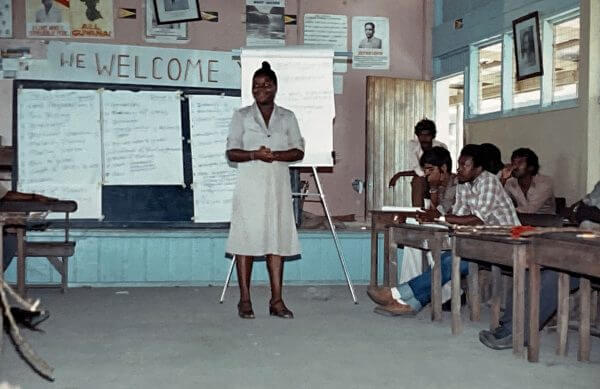 August 24
August 24
The Cassava group presented a very good workshop. Some problems, but nothing serious. At the end, when they asked for two volunteers to grow 1/2 acre each of the new variety as experimental plots, they got 12 offers!
The Cabbage group, which was supposed to be observing today, kept talking during the presentations (James, their advisor, a 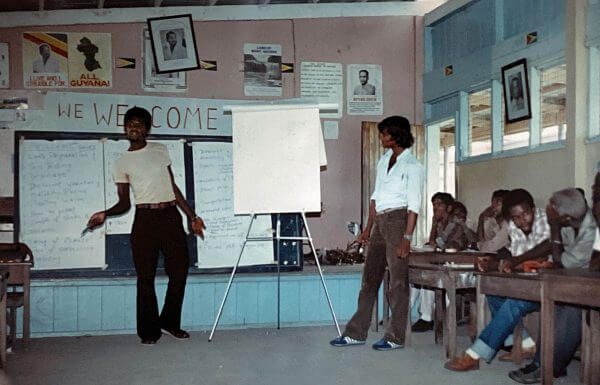 major offender). They were also prepping their materials during the Cassava Workshop despite being told they couldn’t use today for that. I spoke to individuals as bad behavior happened and to the group during lunch.
major offender). They were also prepping their materials during the Cassava Workshop despite being told they couldn’t use today for that. I spoke to individuals as bad behavior happened and to the group during lunch.
Anyway, it was a good day on the whole, and we came back across the Demerara in high spirits, dropping people off along the way.
August 25
The Cabbage Workshop was the reverse of yesterday’s on cassava — slick and well-organized but mostly top-down, with little farmer participation.
Perhaps the validation of the ag. comm. course came from a farmer who gave us a “vote of thanks” as it’s called here: “I’ve been to school and to university, but I never had such presentations as these.” I got all teary-eyed, and Walter reached out to shake my hand as we stood at the back of the room.
In the end, it doesn’t matter what I think or what Walter thinks or what anyone else thinks. If the farmers say their workshops were useful, positive experiences, then maybe our course helped the extension agents.
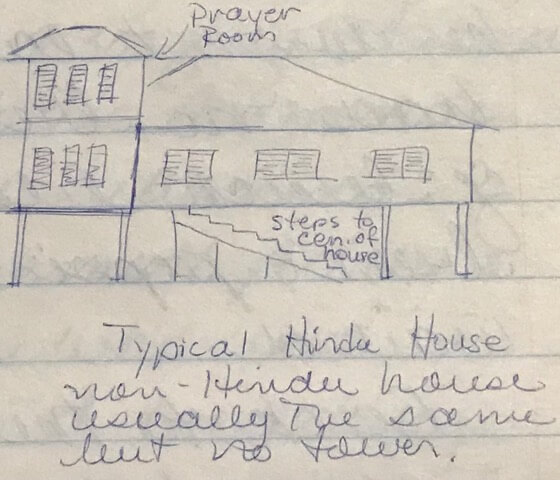 We all had a big cheer and went over to Harry’s house for leftover chicken compliments of MOA and beer, rum, gin and soft drinks compliments of N.S. We had a nice party under Harry’s house, and when I went upstairs to take Harry’s women (wife, grandmother, sister, etc.) some chicken, his wife asked me to stand as godmother for their new baby. Well, I was enormously touched and said, quite truthfully, that this was one of the most wonderful things that ever happened to me.
We all had a big cheer and went over to Harry’s house for leftover chicken compliments of MOA and beer, rum, gin and soft drinks compliments of N.S. We had a nice party under Harry’s house, and when I went upstairs to take Harry’s women (wife, grandmother, sister, etc.) some chicken, his wife asked me to stand as godmother for their new baby. Well, I was enormously touched and said, quite truthfully, that this was one of the most wonderful things that ever happened to me.
***
Reviewing these journals decades later has given me insights I missed at the time. One is the generational gap in the theory and practice of international development. Those of us from Peace Corps backgrounds and/or graduates from institutions like The American University’s International Development Program had a vision of ourselves as helpers and facilitators. We were imbued with the philosophy of empowering people in the Third World to define and solve their own problems in culturally and locally appropriate ways. The older generation of Americans behaved as if they had all the answers, based on U.S. practices, which they presented in a top-down manner, frequently lacking in cultural sensitivity.
Pairing these two generations in development projects created all kinds of tension and decreased effectiveness. When Joe in Somalia or Jorge in Guyana and I worked together to develop hands-on experiences for workshop participants, I think it must have had at least two negative outcomes for the older generation with whom we were partnered. At the very least, it must have caused dissonance for the older guys: why were we emphasizing all this “process stuff”? At worst, it might have been intimidating; these younger folks were getting kudos while they were being criticized. Meanwhile development institutions and consulting firms were combing data banks to find qualified candidates for hundreds of jobs during a time of transition from old school to new school. Tough on everybody.

COMING NEXT MONTH
A failed radiator on safari, a film crew in Sri Lanka, a coup in Ghana,
an assassination in Paris, outcasts in Mumbai:
Guest Contributors Tell Their Stories

LET ME HEAR FROM YOU.
Please take a moment to share your thoughts.
Your comments help make the blog better, and I always answer.

If you enjoyed reading this post, I hope you’ll SUBSCRIBE by clicking on the button below. Every month, when I post a new excerpt from my life overseas, you’ll get an email with a link so you can read the next installment. Subscription is free, and I won’t share your contact information with anyone else. Your subscribing lets me know you’re reading what I write, and that means a lot.
